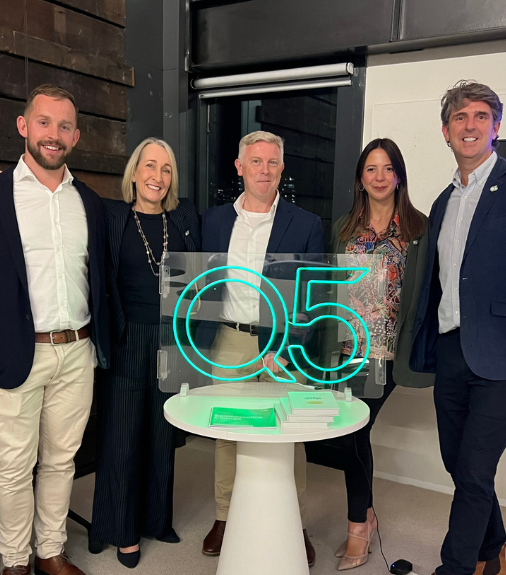
At a recent Q5 event in Sydney, Lyndal Hughes, MD of Q5 Australia, led a thought-provoking discussion on transformation beyond traditional change initiatives. Panellists Chris Parsons, Nicky Bowie, and Ed Bridgeland shared diverse perspectives, emphasising the importance of emotional readiness, team unity, and a strategic, holistic approach to true organisational transformation.
Reading time: 4 minutes
Transformation is more than the sum of multiple change initiatives. Transformation is a fundamental shift in an organsation in what it does and how it does it. This elevated view of transformation was the starting point for a fascinating conversation at a recent Q5 forum, with our three panellists Chris Parsons, Nicky Bowie and Ed Bridgeland. As a co-founder of Q5 Chris was able to bring a global perspective, Nicky as the CEO of Hospitals united for sick kids brought a NFP lens, drawing on extensive experience as a transformational leader at Unilever, and Ed provided a public sector view.
All agreed that the scale and intensity of transformation means that it needs to be treated as an emotional experience, and often an experience of threat. The thinking and approach to transformation must be different to incremental change. A cornerstone to success is in bringing the team together and having them stay with you throughout. Being ‘real’ is more important than ‘making it wonderful’. Be overt with the why of transformation, and articulate well for the collective and the individual. Ensure the approach has both ‘push and pull’ aspects to it. Transformation won’t occur without a mindset shift. The orientation of all leaders and the whole business needs to be towards the new goal. There might be a crisis in feeling loss, or the shifting of comfortable relationships. All of this needs to be addressed as part of the approach.
A watch-out was given in making sure not to consider tech changes or becoming digital as being a transformation. These are system changes. Transformation extends into a shift in aligning the whole business towards a strategic imperative. Operating model, organisation design, ways of working, decision cadences, definitions of success and value are all components of true transformation.
So where to start? Start by listening to the people throughout the organisation. Bring people together who have never sat in the same room before. Be open to the unexpected. Find out where the work-arounds have become common and where can they see a better way. Allow space for the possibility of new ideas.
What do we need from leaders? To show courage, to be ‘ballsy’ and to deliver on the promise. Believe in the transformation and carry a strong narrative. Realise that you won’t have all the answers up front, so share what you know, and take your people on the journey with you, as you adjust to learnings along the way.
Most of all, keep the vision grounded and cut through issues ‘sideways’, not in the normal ways which have created the need for transformation in the first place.
